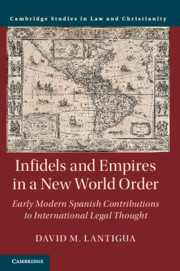 Infidels and Empires in a New World Order
Infidels and Empires in a New World Order Book contents
- Infidels and Empires in a New World Order
- Law and Christianity
- Infidels and Empires in a New World Order
- Copyright page
- Dedication
- Contents
- Figures
- Acknowledgments
- 1 Introduction: International Relations Beyond Westphalia
- Part I The New World Crucible of Infidel Rights
- 2 Theocratic World Order and Religious Wars
- 3 Spanish Dominicans and the “Affair of the Indies”
- 4 The Politics of Natural Law at Valladolid, 1550–1551
- Part II God, Empires, and International Society
- Bibliography
- Index
2 - Theocratic World Order and Religious Wars
from Part I - The New World Crucible of Infidel Rights
Published online by Cambridge University Press: 11 June 2020
- Infidels and Empires in a New World Order
- Law and Christianity
- Infidels and Empires in a New World Order
- Copyright page
- Dedication
- Contents
- Figures
- Acknowledgments
- 1 Introduction: International Relations Beyond Westphalia
- Part I The New World Crucible of Infidel Rights
- 2 Theocratic World Order and Religious Wars
- 3 Spanish Dominicans and the “Affair of the Indies”
- 4 The Politics of Natural Law at Valladolid, 1550–1551
- Part II God, Empires, and International Society
- Bibliography
- Index
Summary
The question of rights for non-Christians emerged out of a theocratic papalist conception of world order during the medieval crusades typified by the canon lawyer Sinibaldo Fieschi (later Pope Innocent IV). It then informed the dominant and ambivalent legal view of Christian-infidel relations in Latin Christendom represented in very different ways by both Innocent IV and his creative commentator, Polish jurist Paulus Vladimiri. This chapter considers the political translation of Innocent’s canon legal opinion on Christian-infidel relations to support the Iberian cause of missionary war in spreading the faith through Crown and Empire across the Atlantic. Theocratic world order, as articulated by Spanish royal jurists and conquistadors like Juan López de Palacios Rubios and Hernán Cortés, chiefly rested its justification for European expansion on the right of punishing infidels for their violation of natural law, the sin of idolatry above all. Infidels had dominium, in principle, but Europeans could claim superior jurisdiction over them when they presented obstacles to the spreading of religion and civilization.
Keywords
- Type
- Chapter
- Information
- Infidels and Empires in a New World OrderEarly Modern Spanish Contributions to International Legal Thought, pp. 31 - 73Publisher: Cambridge University PressPrint publication year: 2020


